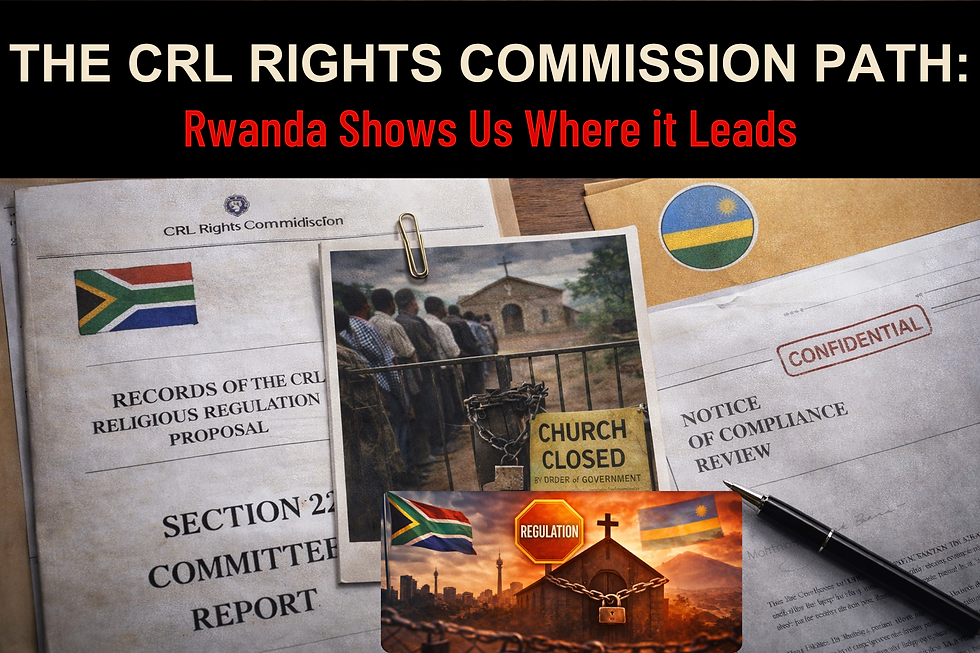The CRL’s “Supermarket” Comparison: A Threat to Religious Freedom and Faith Giving
- SACD MEDIA

- Aug 11, 2025
- 4 min read
The CRL Rights Commission has taken it upon themselves to compare churches that sell faith-based products such as books, CDs, conferences, or anointed items to supermarkets.
They argue that this is the “commercialisation of religion” and that government must step in to “protect the vulnerable” from financial abuse.
At first, it may sound noble. Who wouldn’t want to protect people from being exploited? But let’s be clear. This is not just about money. This is about control. It is about opening the door for the State to decide what is “acceptable” in the Church, how we give, and ultimately, how we worship.
Once the State steps into that territory, our religious freedom is no longer a God-given right. It becomes a privilege granted and managed by politicians.

Who Decides What is Acceptable in Faith?
For centuries, faith giving has been an act of worship. In Christianity, tithes and offerings are not mere transactions. They are sacred, rooted in Scripture, and given in obedience to God.
If a believer chooses to sow sacrificially, trusting in God’s promise, who is the State to declare that decision “too much” or “unwise”?
The CRL’s position assumes that believers don’t know what they are doing. That they must be “protected” from their own faith. This is an insult to the intelligence and spiritual maturity of millions of South Africans.
Faith Is Not a Commodity
A supermarket sells goods. You pay and you walk away with bread, milk, or vegetables. That is commerce. But when a church offers books, music, or tickets to a faith event, it is not just selling a product. It is sharing a message, a calling, a ministry tool that can change lives.
The CRL’s “supermarket” analogy strips faith of its spiritual dimension and reduces it to a financial transaction. This is a dangerous misrepresentation because it lays the groundwork for the State to treat the Church like any other business, subject to the same controls, taxes, and inspections.
The Risk of State Overreach
The South African Constitution guarantees freedom of religion, belief, and opinion. That freedom is not a favour from the State. It is a right. When the government begins deciding how churches raise or use money, it is no longer protecting freedom. It is undermining it.
One of the most dangerous aspects of the CRL’s proposal is the precedent it sets. Once the State has the authority to regulate financial practices within faith communities, it can begin to control other areas — such as sermons, doctrines, leadership appointments, and even the content of worship.
History is filled with examples of governments that began by regulating “for protection” and ended up restricting religious freedom entirely. South Africa’s Constitution guarantees freedom of religion, belief, and opinion. These rights are not privileges granted by the State; they are fundamental freedoms that the State is bound to protect.
Any law or policy that allows the State to decide what is or isn’t acceptable in faith giving is, by definition, a violation of that constitutional guarantee.
The “Protection” Argument Is Misleading
The CRL has framed its proposal as a defence of the vulnerable — those who may be manipulated into giving more than they can afford. While this concern may be genuine in some isolated cases, the solution cannot be to police entire religious communities based on the misconduct of a few.
If the State truly wishes to protect citizens from financial harm, it already has mechanisms to prosecute fraud, misrepresentation, and theft. Applying these existing laws is a far more just and constitutional approach than creating a new layer of state control over religion. This argument paints believers as helpless victims. We are not children. We give freely, out of conviction, not coercion. We know the difference between faith and fraud.
This is Bigger Than Money. It is About Freedom
If the State can dictate how the Church uses its resources, what is next? Will it decide what sermons can be preached? Which missions are “acceptable”? Which teachings are “appropriate”?
This is the slippery slope we must resist. Today they regulate our giving. Tomorrow they regulate our worship.
A free Church is essential to a free society. Without it, democracy weakens and tyranny grows.
The Church Must Stand Together
The South African Church Defenders (SACD) believes this is not the time for silence. Every pastor, leader, and believer must understand what is at stake. We are not just defending our bank accounts. We are defending our altar, our pulpits, and our right to serve God without interference from the State.
We must:
Educate our congregations about the real dangers of this proposal.
Engage the public process by sending written submissions to Parliament.
Unite across all denominations to speak with one voice: Hands off the Church.
Conclusion: This is a Call to Action
The CRL’s “supermarket” comparison is not harmless rhetoric. It is the opening line of a policy that could change the Church forever. We cannot allow the State to redefine faith giving as a matter of government approval.
This is a moment for courage. As Jude 1:3 commands, “Contend for the faith that was once for all entrusted to God’s holy people.”
We must make it clear. The Church is not a department of the State, not a business, and certainly not a supermarket. Our giving is to God, our accountability is to Him, and our freedom to worship must remain untouchable.



Comments